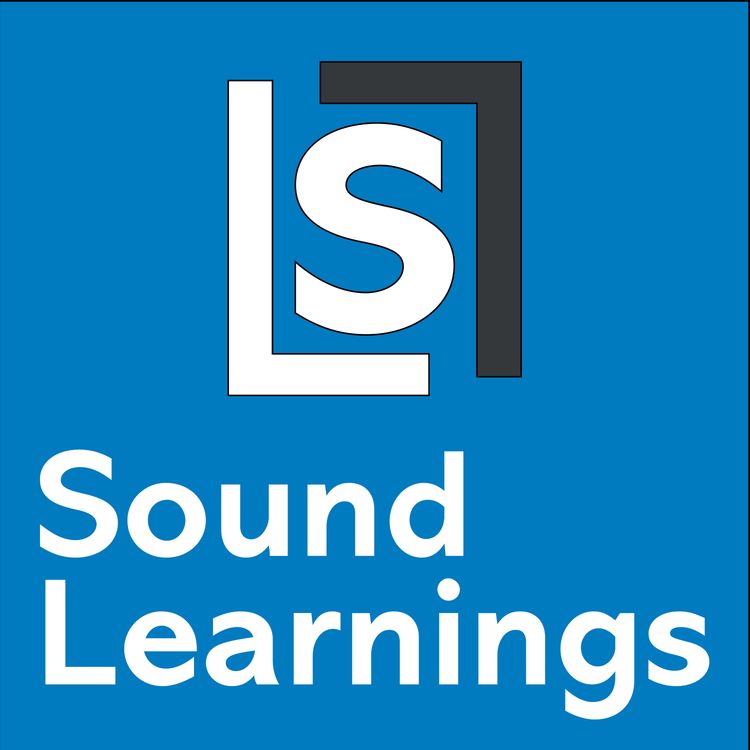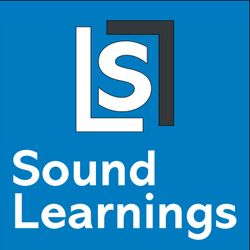Share

Sound Learnings
Season 1 Trailer
Season 1, Ep. 0
•
S1E0 – Trailer and Introduction to Sound Learnings
A podcast about Education in Audio, Music Production, and Music Technology.
Tim Canfer, host of this new podcast, introduces this new podcast where he and his co-hosts chat with engineers, producers, lecturers, tech developers and other cool people. He is joined by Carola Boehm and Russ Hepworth Sawyer. Sponsored by Routledge.
For more information please see www.soundlearnings.com or on Twitter @SoundLearnings
More episodes
View all episodes

8. E8: Kirsten Hermes. Electronic musician Nyokee, and Senior Lecturer at University of Westminster
50:46||Season 1, Ep. 8A podcast about Education in Audio, Music Production, and Music Technology, (including a plug for the exciting new podcast conference EPod 2023)Our penultimate conversation from the vault of chats in 2020. Kirsten is an audiovisual artist/academic who produces music under the electronic artist alias Kyokee and teaches at the University of Westminster. We chat about Kirsten's migration from Germany to England, her teaching at the University of Westminister and her experiences as an artist in much demand. We talk about new media, ideas of liveness and performance and her book, "Performing Electronic Music Live" (see link below).Joining us as usual in this episode is host, lecturer, and tech developer Tim Canfer, music producer and academic Russ Hepworth-Sawyer and Carola Boehm, Professor of Arts and Higher Education at Staffordshire University.Links and Sources:Kirsten's site at the University of Westminster: https://www.westminster.ac.uk/about-us/our-people/directory/hermes-kirstenA link to Kirsten's 2022 book "Performing Electronic Music Live" Kirsten's music site: https://www.nyokeemusic.com/
7. E7: Katie Tavini. The realities of work as a mastering engineer and educational experiences
48:32||Season 1, Ep. 7A podcast about Education in Audio, Music Production, and Music Technology.Katie Tavini is a Mancunian mastering engineer with credits that include Emeli Sandé, Arlo Parks and the Royal Philharmonic Orchestra. We spoke to this highly in-demand master engineer almost two years ago (and yes, sorry! It has been that long, but we have some more great chats to drop before the end of the year). The conversation is worth the wait, flowing from the requirements of sound engineering, the differences in the profession from classical to pop, from German contexts to British ones, and from London to the North and back to the South. Her versatility in her engineering practice is just as versatile as the locational contexts. Liking a challenge, she has travelled from being a violinist to an in-demand mastering expert, navigating different technologies through the years as well as mastering for different media channels. On top of this, she has started her own creative mastering collective, Weird Jungle. She shares with us some fascinating insights and unmissable advice.Joining us as usual at our roundtable in this episode is host and tech developer Tim Canfer, music producer and academic Russ Hepworth-Sawyer and Carola Boehm, Professor of Arts and Higher Education at Staffordshire University.Links and Sources:Katie Tavini’s Homepage: https://www.katietavini.co.uk/Katie Tavini at Steinberg: https://www.steinberg.net/stories/katie-tavini/Weird Jungle: https://www.weirdjungle.com/
6. E6: Amlak Tafari. Reggae bass maestro shares tales of a musical, educational and academic life
55:55||Season 1, Ep. 6A podcast about Education in Audio, Music Production, and Music Technology. In this episode we talk to Amlak Tafari, English-born Jamaican and ‘International Reggae Am-BASS-Ador’. Amlak is bass guitarist for Grammy award winning roots reggae band Steel Pulse, he has also played extensively with Pato Banton and a huge list of other international musicians, as well as being an educator, academic and all round great guy to chat with.We talk about Amlak's rich musical past, his experiences in the music industry and cultural issues of bigotry and racism. We also talk about his route to Higher education and the problems he experienced.At Sound Learnings we are keen advocates for effective higher education and a key part of that is being unflinching in discussing core problems of higher education, in particular the snobbery and racism discussed with Amlak in this episode.As well as that there are some great stories of life as a true muso with funny and surprising insights.Links and Sources:Amlak's IMDB profile: https://www.imdb.com/name/nm3897782/bioSteel Pulse website: https://steelpulse.com/ most recent album Mass Manipulation available nowLink to call for contributions for the Perspectives on Education in Audio and Music Production (POEM) book Podcasting & Education: Concepts, Communities & Case Studies (Routledge) mentioned in the intro https://www.poem-series.com/call-for-contributionsLink to Tim's new plugins https://www.reactivebacking.com
5. E5: Bill Evans. Tales of prog rock super stars, tech development, research and HE advocacy
01:00:58||Season 1, Ep. 5A podcast about Education in Audio, Music Production, and Music Technology. In this episode we talk to Bill Evans, producer, researcher, educator and entrepreneur. Bill is the executive producer who brought together the American supergroup Flying Colors, with musical giants such as Mike Portnoy, Dave LaRue, Casey McPherson, Neal Morse and Steve Morse. Their first album, released in 2012, debuted at No 9 on the Billboard’s Hard Rock Charts (No 11 on BBC’s Rock Album charts). In our chat we discuss the world of the hard-rock music scene and Bill shares some fascinating stories and anecdotes that contain some serious name dropping! Bill also explores many of the 'secret sources' of his work in our chat, specifically his Harmonic Phrase Analysis and his technologies for live performance production. We also talk about how research (specifically a PhD), balancing the search for new knowledge with the day-to-day needs of the industry, the teaching and learning of students, and the day-to-day work of producers in the industry can all be mutually beneficial. Links and Sources featured in this Episode:MMU (Nov 2015) New technology puts concerts in your pocket, https://www.mmu.ac.uk/news-and-events/news/story/?id=3985 Flying Colors http://flyingcolorsmusic.com/ All about Rock (2019) Flying Colors – Third Degree https://allabouttherock.co.uk/flying-colors-third-degree/ Flying Colors Wikipedia Entry (2020) https://en.wikipedia.org/wiki/Flying_Colors_(band) Tim's technology projects also get a mention too, for more information please see https://www.reactivebacking.com
4. E4: Mike Cave. Owner of the Loft Studio in Liverpool
40:08||Season 1, Ep. 4S1E04 – Liverpool, Mastering and Production Sector and Mike CaveA podcast about Education in Audio, Music Production, and Music Technology. This not at all festive episode is a chat with Mike Cave, founder and owner of Liverpool based LOFT STUDIOS since 2002. We chat about what it means to be a music business in Liverpool, and issues regarding connectivity to London. Also, we cover the blagging it took to get there, and of course what it means to be interconnected between educational and creative industry sectors. As always, joining us at our roundtable in this episode is host and tech developer Tim Canfer, music producer and academic Russ Hepworth-Sawyer and Carola Boehm, Professor of Arts and Higher Education at Staffordshire University. Links and Sources featured in this Episode:Mike’s Wikipedia Entryhttps://en.wikipedia.org/wiki/Mike_CaveLoft Mastering at THE LOFT STUDIOS in Liverpoolhttps://loftmastering.com/equipment/
3. E3: Mike Exarchos (Stereo Mike). Lessons of a major label HipHop artist, an academic and lecturer
46:50||Season 1, Ep. 3S1E03 – Mike Exarchos (Stereo Mike)A podcast about Education in Audio, Music Production, and Music Technology. In this episode, we chat with Hip Hop Artist and MTV Award winner Mike Exarchos. Mike was born in Greece and came to the UK to study in Leeds and London. During his studies, he continually worked as a sound producer in the British hop hop scene, including working with names such as Klashnekoff, Bury Crew, Skinnyman, Taskforce, Iceberg Slimm, Mike GLC and JMC.His first album attracted industry attention and he was nominated at the Mad Video Music Awards in 2005 for "Best Hip-Hop Video Clip" and in 2008 for "Best Hip-Hop Video Clip" and for "Video Clip of the Year". He also featured in the 2011 Eurovision Song Contest Final, and being signed by EMI, in this episode we thus will be talking about that juggling act of allowing a high-profile industry practice to interact with an academic practice. Additionally, we chat about how we in our universities allow industry and the educational space to become much more interlinked than ever before, how our universities become more permeable. This of course despite some challenges of being both an academic and a industry practitioner at the same time. Links and Sources featured in this Episode:Watch Stereo Mike as part of the Team which came 7th in the Eurovision Song Contest in 2011: https://www.youtube.com/watch?v=FdZzklXoAOg Stereo Mike on Wikipeda https://en.wikipedia.org/wiki/Stereo_Mike Mike Exarchos on Soundcloud https://soundcloud.com/mike-exarchosMarshall, W. (2006). Giving up Hip-Hop's Firstborn: A Quest for the Real after the Death of Sampling. Callaloo 29(3), 868-892. doi:10.1353/cal.2006.0149.Correction: Tim mentions a survey by NME showing percentage of artists from private schools, the survey was actually conducted by the now defunct The Word magazine, but is quoted as follows in the Daily Mail article referenced below: “A survey from 2010 by The Word magazine found that at least 60 per cent of chart pop artists went to private schools, but 20 years before this figure was just one per cent.”Dailymail.co.uk, (2018). BBC slaps down DJ Cerys Matthews over her BAN on public school-educated bands from Radio 6 show that sparked MPs calling for her to quit. https://www.dailymail.co.uk/news/article-6170649/BBC-DJ-Cerys-Matthews-admits-refuses-play-records-privileged-pop-stars.html
2. E2: Tim 'Spag' Speight. Pro studio tales and educational insights
33:38||Season 1, Ep. 2S1E02 – Tim (Spag) SpeightA podcast about Education in Audio, Music Production, and Music Technology. In this episode, we meet up with Music Producer and Educator Tim ‘Spag’ Speight, a professional both in the music industry and in further education. Spag is a freelance recording and mix engineer and a course leader at Barnsley College. He’s worked for some of the greats, Pete Waterman, Simon Cowell, Donna Summer, Steps, Westlife, McFly, Kim Marsh, S Club 8, Dannii Minogue and many others. We start off exploring the rather bleak industry forecasts for our creative sectors, currently suffering and expected to be suffering for some time to come due to the global pandemic.Spag chats about his career, how he regained his creative spark, and we ask the question if music production is exclusively a young man’s game. We also discuss how the industry has changed with the availability of smaller, more mobile technology. Our discussions also revolve around that elusive link between academia and industry, the differences and the similarities, and how we - as educators - allow the next generation of upcoming talent to be inducted into a professional community within the industry. We also end with the revelation of just how some pro vocals manage to sound as pro as they do: its Vocal-gate, but not that kind of gate!..Links and Sources featured in this Episode:Tim Spag Speight LinkedIn Profile - https://www.linkedin.com/in/tim-spag-speight-95438433/ Oxford Economics (2020). The Projected Economic Impact of Covid-19 on the UK Creative Industries. [Online]. Oxford. Available from: https://www.creativeindustriesfederation.com/sites/default/files/inline-images/20200716_OE_Slides_new%20ACE%20data%20-%20Clean%20-%20with%20NEMO%20caveat.pdf. [Accessed: 21 July 2020].
1. E1: A decade of Music Technology degrees
31:06||Season 1, Ep. 1S1E01 – Introduction to Sound LearningsA podcast about Education in Audio, Music Production, and Music Technology.In this first episode, the hosts of this podcast introduce Sound Learnings, a new audio-oriented podcast with a roundtable of experts in music production and music technology. We discuss news, stories and publications with one or more guest presenters - people who are top of their game in either Education, Audio, Music Production and or Music Tech development. And yes, we will fight about terminology, haggle about where the industry is going, laugh about some of the techy excesses of the past, and try to understand the role of universities in all of this.At our roundtable in this episode is lecturer, musician and tech developer Tim Canfer, music producer and academic Russ Hepworth-Sawyer and Carola Boehm, Professor of Arts and Higher Education at Staffordshire University. …. and do not... ever … mention the lossless/lossy debate...Links and Sources featured in this Episode:· Boehm, C. (2007). The discipline that never was. Journal for Music, Technology and Education. Vol 1, 2007 (Journal Article).https://doi.org/10.1386/jmte.1.1.7_1· Hepworth-Sawyer, R., Hughes, N., Ziemba, D. & BOEHM, C. (2018). The discipline that ‘became’: developments in music technology in British higher education between 2007 and 2018. Journal for Music, Technology and Education. [Online]. (Journal Article). https://doi.org/10.1386/jmte.11.3.251_1· Garland, C. (2008). The McDonaldization of Higher Education? Notes on the UK Experience. [Online]. 4.1. Available from: http://www.uta.edu/huma/agger/fastcapitalism/4_1/garland.